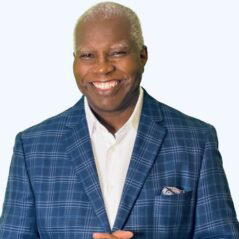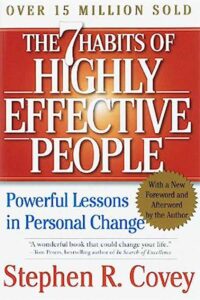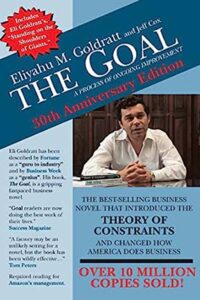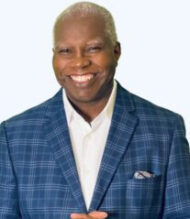Posted on July 24, 2023
Maximizing productivity is a vital process in your career success that is certainly easier said than done. If you want to do this more effectively, the secret is looking inward. Joining Steph Silver is CEO, Growth Strategies Coach, Author, and TEDx Speaker Gerald Leonard. He discusses how he crafted a unique approach to boosting productivity by integrating music and tapping into the neurochemicals within your body, allowing you to perform at your best without getting stressed out or pushed to your limits. Gerald also discusses why personal and professional work can never be separated, as well as how journaling can harness your inner ability to grow and heal from negativity.
Gerald has created several free resources for our listeners and readers. Find out more here.
—
Listen to the podcast here
Maximizing Productivity Through Neuroscience And Journaling With Gerald Leonard
Our guest is Gerald Leonard. He is a true powerhouse in the field of productivity, intelligence and a leading figure who has revolutionized the way we approach maximizing our potential. Gerald’s insights have been featured on platforms such as NPR and Jack Canfield Show, among others. On a professional basis, Gerald offers a unique approach to accomplishing more productivity in the workforce. He is an international keynote basis and culture exchange expert. His programs integrate music, productivity, workplace culture, and neuroscience. I am excited to talk to you, Gerald. There is so much to talk about.
I’m happy to be here. I look forward to having our conversation.
First of all, we want to dig into the nitty-gritty, but we need to get to know you a little bit first for those who don’t already know you. Tell us about your journey of how you got to where you are now.
The music part came in very early in my life. I was ten years old when I first started playing. I’ve been playing for a long time. Music has been a real cornerstone for me as far as what I learned playing music from learning to practice, taking lessons, paying for lessons, and so on. I did my Bachelor’s and Master’s in Music. I studied at Juilliard for a year with a gentleman named David Walters through the Master School of Music. I did some ministry work for about 6 or 7 years.
I decided I go back into music. At this time, I got married and had kids. This is a little bit about my story. My dad was always there for me. Every time I woke up in the morning, I’d see him getting up and get going to work. He had his own construction business. I was living in New York and when I thought about getting back into music, I decided not to go on the road and not to be a road warrior because I wanted my kids to see me there. I kept playing locally, but to make a living, I got into IT. What it did is it gave me visibility of what’s happening in Corporate America and also playing concerts, shows, rehearsals, and so on.
I started seeing the similarity between great performing teams and businesses, organizations, and cool performances. There were a lot of similarities. Eventually, I ended up writing my first book Culture Is The Bass. A company or people’s culture is more about the feel and values of how we live. I wrote a book called Workplace Jazz. My new book is A Symphony Of Choices. You see our theme there. Everything has a musical metaphor, but it’s baked in with a lot of processes, practices, and neuroscience. I did a lot of certifications and so on. It drove me to where I’m at and there’s some more as far as what drove me into neuroscience as well.
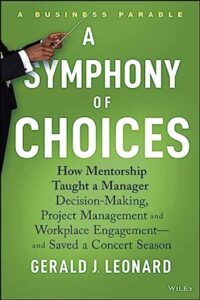
A Symphony of Choices: How Mentorship Taught a Manager Decision-Making, Project Management and Workplace Engagement — and Saved a Concert Season
My ex-husband is a musician. I lived in that world and toured a little bit. We made the same decision to stay home because it’s a big decision to be made. I live in Austin, Texas. Every single person has at least a guitar. I’ve known a lot of musicians. I only know one other than you who has seen the correlation of basic human nature in teams between music and performance and business and performance. I feel like people try to segment their lives so much. They say like, “This is my personal life. This is my business life. This is my church life. This is my school life.” Everybody feels like everything is segmented. How wonderful of you to see the correlation of human nature.
Put it this way, what you get from me is this is who I am. This is my life. My clients know that when they are hiring me as a consultant, they’re also hiring this guy who’s a professional bassist, an author, someone who does podcasts, and who does research neuroscience. They enjoy that because many times, we’ll have our business conversations and then these side conversations or calls where they’re saying, “I’m getting ready to do some music stuff. Give me some of your advice. I’m working on this. What do you think about that? I want to bring you into this meeting. It’s not what we hired you for, but you’ve had so much other experiences. Can you shed light on this other part of our business with your experience and what you’ve seen out in the industry?”
It makes a big difference when you bring your whole self and be authentic. Have the mindset of being of service. That’s been my mindset. I want my life to make a difference. I want to have an influence and impact on people to where they can grow and also understand the principles of, “I can be productive and successful without being stressed out and worn out.” Especially in the music field, one of the things that I would say hurts me the most when I think about great musicians is that when they put themselves in a place where they’re always on the road and are not giving themselves a break, time to meditate and live. It’s the same story. They always end up on drugs. They always end up in this life. Their marriages fall apart. All these things fall. I’m thinking, “It doesn’t have to be that way.”
It makes a big difference when you bring your whole self, be authentic, and have the mindset of being of service. Click To TweetThe parallel, what I’m seeing there is the higher you get in business, it’s very similar as well. You get driven and into the singularity of what you’re doing. If you don’t take the time to consciously recalibrate, meditate, spend time with your family, and see the beautiful balance of being clear-minded and a whole human, then you can get lost in your business, in drugs, and the world of being outside of yourself.
Another part of my story that happened to me in 2018 was I was at a Christian retreat, a workshop, and this was with my first wife. I say that because when I went through this experience, it exposed a lot of things in the marriage, and things fell apart. From that perspective, I ended up getting remarried. However, on the 2nd or 3rd day of the workshop, I had a major bout with vertigo first thing in the morning. They had to come in and rush me to the hospital. It wasn’t normal vertigo. I wasn’t sure what was going on. All I knew was the room was spinning and it wouldn’t stop. It was bad. I spent a day and a half in the hospital before the doctor allowed me to come home.
When I came home, vertigo could stop the medication. My eyes were going horizontally fast and I lost the ability to walk. It impacted the vestibular system. Some people would call it a disability. I call it a constraint. It gave me a vestibular imbalanced constraint. What that means is I literally lost the ability to walk. I had to come home and had to prove I could walk with a walker. The interesting thing about this is this it happened six weeks before I was scheduled to deliver a TEDx Talk.
I’m lying in bed. It wasn’t a headache, but it felt like someone had hit me in the head with a baseball bat and I had a concussion. I felt like I was also on a big ship. I couldn’t watch TV or look at my laptop. At that time, I was a contractor running my business and making things happen. I’m lying there thinking, “How am I going to give this talk?” My talk is What If Practice Is The Performance, The Neuroscience Of Music? The idea is even full-time working, musicians only spend 5% of their time performing professionally, but 95% are preparing their practicing or rehearsing.
I started practicing my bass the week after. I was able to at least move enough to get to my room. I hold onto the walls and use the walker. I grabbed one of my basses. I played a little bit and went back to bed. The reason I did that was one of the things that I had researched was that as a musician, when you’re playing music, your brain is active. If there’s damage in the neurological network of your brain, it will start repairing itself.

Maximizing Productivity: If there is damage in your neurological network, the brain will start repairing itself.
Every day, I would practice a little bit, slowly start walking, holding onto the walls, and I could do it without holding onto the walls. I noticed after I did it the first time, I felt better. Things felt a little calmer. I said, “This is what I’m going to do.” Three weeks after that, I walked into my ear, nose, and throat doctor’s first appointment very gated and deliberate but unassisted. He looked at me and said, “You’ve already started your therapy,” once he realized I had been practicing music and what I was doing.
He tested me and said, “You’ve lost 86% capability in your right inner ear. You only have 14% ability.” I kept doing what I was doing and started doing vestibular therapy as well. Three weeks later, I walked on stage and delivered my TEDx Talk. It was about going back to what I did as a kid. You practice, get advice, listen to your inner self, set a goal, and figure things out. What’s interesting is that through that process, a lot came out of my marriage. We ended up getting a divorce. I got remarried. Since that time and with all of that happening, I have become more productive in my life in this stage with my constraint than I was before.
It was stepping back. I started reaching out to other coaches, mindset coaches and neurologists. I made yoga, meditation, and made all these different things like that a part of my day. I focus my day now on managing my calendar and energy. That allows me to make some major changes, get a lot of things done, write my books, and everything else. It’s impacted my life in a big way. One of the things I do is a weekly evaluation of my week. It’s something that I’ll share at the end that people can download. It’s like a worksheet. It helps me to review my week and think about, “Where am I going? Am I still on track? What are my goals?” It’s a lot more about mindfully, strategically going after where I’m trying to go with my life and what I’m trying to do. It made a major difference.
Thank you for sharing all that. I had many questions pop up all the way through. Did you look at productivity before vestibular?
It was interesting when I got into IT and business to being a musician, I was always a very self-reflective type of person. I remember driving my kids to camp one time. I was thinking, “What am I good at?” I thought, “Every time something is chaotic, I’m good at getting in, organizing it, straightening out, and creating a process around it. It’s all working now because it let me go to the next thing. I get bored.” I realized that was what I was naturally good at. When I looked across the landscape of project management, IT, and everything, it was IT and project management. I leveraged that information. I had been “doing” productivity type of work for a long time.
When I decided to go after it, I read every book I could find. I went to every webinar I could find. I was the president of the Microsoft Project user group in the DC Baltimore area for nine years. I did projects for major corporations, the National Archives, the Defense Logistics Agency, and a bunch of different organizations like that. Productivity has been a part of my life for a long time. I was very able and capable of traveling here and there and running.
I always tried to have a balance. It was one of the things that I did early. I love reading. I read Stephen Covey’s book, The 7 Habits. I love the weekly review. That’s I created my own worksheet around that. I love the idea of identifying your key roles, and then I would every week identify 1 or 2 things in each role that would move the ball forward to where I was trying to go.
I would schedule those in my life so that I could walk around the bass and touch every bass but not feel overwhelmed because sometimes you live life and you’re working in this area, but you’re neglecting your marriage, your kids, or this. I found that that process allowed me to move the ball forward and the things that were important for me, but at the same time, make sure I touched all the important places in relationships in my life and that they have my time as well.
When you analyze your week, are you looking at your relationships and your personal life as well?
I am. It’s not just about the business because I don’t think there’s a real thing as a work-life balance. I think it’s work-life. The balance is that we have to figure out how to pursue it all or take it all in. When I look at my week, I’m not looking at, “What do I have on my plate for work?” It’s, “What do I have on my plate?” Whether it’s music, work, writing a book, preparing for a speech, working on a song, preparing for a podcast, or whatever that may be, it’s, “What is my life?” Even now, I do that and I manage my day accordingly.
I know that I have a number of interviews and things that I’m doing so I have to manage my time, schedule, and energy, and if I need to take a nap, I plan that nap. I’ll plan a 30-minute nap in the middle of my day if I have 2 or 3 meetings that I know are going to be emotionally or mentally taxing. I’ll plan it in, take that nap, and now I’m rejuvenated and ready to go. I’ve learned again between meditation and things called brain gyms and things like that, Qigong exercises, things I would’ve never done before. Sometimes God brings things into our life and says, “You need to slow down. You need to reassess.” Those things are fine, but we need to think about, “What do I need to reassess? What do I need to think about?”
God brings things into your lives to help us slow down and reassess everything. Click To TweetWere you going too hard too fast or not integrating yourself before your incident?
I was probably moving pretty quickly, but I also think it was a number of people in my life were too dependent upon me for certain things. It forced them to have to step up because dad or someone wasn’t there to pick them up and do this for them all the time. It forced them to go, “He’s not going to be able to do that for me anymore. They’re not going to be able to do this. I got to have to face the music and grow up myself.”
Sometimes it happens for those reasons, but I also think for myself, it happened when I needed to step back, reflect on what I was doing, and where I was going. Not that I was reckless, but that I needed to reprioritize and prioritize what was most important and also, self-care because a lot of times, we think we’re burning the candle at both ends and we are.
We’ll catch up with you. We’re talking about the CEO. It’s not necessarily the leader is always the one. Sometimes, it’s the middle manager or someone further down in the process that’s making all the gears turn that is also burning the candle. They are trying to get up that ladder and as they’re working hard to build toward their dream, they don’t realize how much of it they’re burning down in the meantime.
It’s important to have that time to reflect. I’ve been doing the weekly review for myself for a long time on a Sunday morning. I get up early and have a few hours of quiet time, sit back, and think, “What did I accomplish? Where am I going? These are my goals.” I would review my yearly, five-year, or quarterly goals and go, “Am I still on track? Is that still what I want?” I would ask myself those questions. It would help me to reflect and reassess what was going on. At the same time, after the vertigo, I had to take that to a different level. I had to realize that stress is real. By doing yoga in the mornings or stretching at least once a day, it allowed me to release the stress.
It was like ringing the stress out of your body. Having mindful time to meditate and be quiet allowed me to hear my inner voice. A lot of times, I got some of the best ideas from that. When I was more able than I played a lot more golf, I would call it a pocket bring. I learned an idea from Dr. Win Wenger. It’s a notepad. You keep it in your back pocket or in your purse. When you come up with an idea that flashes of intuition, you take it out and write it down because sometimes you go, “I thought about that. I didn’t write it down. Someone else created this great thing.”
You thought, “I thought about it the other day and I should have written it down.” What I decided to do was create practices or habits in my life where I could capture those moments. Some of my best ideas for clients, that move my business forward, and have changed my life have come at very serendipitous times where the idea flows and you go in, “That was weird. Let me write it down, but that’s good and it aligns.” You capture it. Those things are also our major part of productivity and it’s being able to listen to our inner self. I work with a gentleman. He is one of my major coaches Dr. Paul Scheele.
He’s created a number of products and tools that are into whole-brain learning and accelerated learning. Especially after going through what I went through, I’ve gotten to a point now where I read a book a day. You go through a book a day, scan it, do a photo reading of it, ask questions of the author, and identify 4 or 5 key questions you want the author the answer. You go and find the answer. You know more about that book than most people who’ve read the entire book word for word very slowly, but by using this process.
You’re basically using your subconscious mind but also what he calls your non-conscious mind. That’s the part of the mind that runs a lot of our automated systems. It’s a part that deals with intuition and things that we don’t consciously aware of, but non-consciously, we are very much aware of them. When we take it in, process and learn how to leverage it, then we’re realizing that everything that we need, we already have. It’s that the learning and everything else we’re doing exposes what we already are and who we are.

Maximizing Productivity: When we process things on a non-conscious level and learn how to leverage them, we will realize that we have everything we actually need.
It’s been proven that we learn and take in thousands of more bits of information than we realize. When we were driving down the road or walking down the street, we knew what color all the cars were and what the plate numbers were. We know those things, but we don’t have to recall them to move forward in our day. Our brain files them away in a different place. It’s like when you read something that it is all mashed up and your brain automatically puts it all into one place. Our brains are magical and we can make use of that, or we can let our brains run nuts.
Too many people don’t realize how much we can utilize what’s in there and shift what’s in there. Tony Robbins talks about to lots of psychologists and psychiatrists how the vast majority of our habits and our ways of loving and interacting with people are all formed by the time we’re 3 or 4 years old. We think that we’re changing it and learning as we go along, but then we get to be 50 years old and go, “Where that habit came from is because of this thing.” We’re not trying to like to blame it on our parents, but the truth is it’s subconscious and non-consciously.
We’ve been shaped that way, subconsciously or non-consciously. Here’s the thing. goals and affirmations allow us to create a life that we want to and shift. I’ve always been a very goal-oriented person. After the vertigo thing happened, I went to a workshop with a buddy of mine. In fact, I’m going to meet with him and his mastermind group I’m a part of in Nevada. What I learned from him that he learned from Brian Tracy was the power of writing down your goals as affirmations and writing them down every day. Here’s what happens. In our brains, we have what’s called a reticular activating system. It’s a filter because our brains see and record everything, but if the non-conscious mind is exposed to the conscious mind, everything we’ve ever seen would drive us mad.
It’s too much information. The conscious mind is this filter that constantly filters out and erases or puts in the back of our brain where things are and what’s what. It only exposes to us things that are important to us. Hence, when we buy our favorite lovely blue car and pull out of the parking lot, we see that car everywhere. We hadn’t seen it before if you’ve ever had that experience, and that happens because you told your reticular activating system, “This blue car is very important to me. Notice everything about it.” When you have a goal and you say, “My goal is to become X,” the goal is not to achieve that one thing. The goal is to become the person that could have that in their life, which means you have to change and grow.
When you have a goal, the work needed must not be focused on that one thing. It is about becoming the person that could have that in their life. You have to change and grow. Click To TweetBy writing out that goal as your goal, time, date, and smart goals, it challenges and moves your reticular activating system to start seeing everything about that goal. Here’s the magic. If you then turn that goal into an affirmation, “I’m happy and grateful that I’ve accomplished X, Y, and Z by this date, and these are the things that are in my life,” you write that down every day and you add emotions to it. Your brain goes, “Everybody, pay attention. This is important.”
It starts pulling everything together, sending signals out into the universe, and people that you didn’t know start coming up to you and say, “I was thinking the other day. I thought about you. Someone told me about you, and do you need this?” “That’s exactly what I need to do.” It happens all the time radically fast when you write out your goals and affirmations and you do yoga, remove the stress from your life and meditate.
I want to pause right there because the whole time you’ve been saying this, I’ve been wanting to reiterate to the readers that there’s a multi-pronged approach to this. I think this is exactly where you’re going. You have your goal and write it down as an affirmation, “This is the truth now.” You see yourself that way. The biggest distinction in how quickly it comes to pass or how much the universe helps you is one of the things that a lot of people miss, which is believing it to be true, and possible, and saying that affirmation to yourself in a calm, positive state.
That’s where meditation, yoga, and all of those, even if you have a breathing process that you get yourself in to be in a peaceful, calm place to tell yourself that you believe it to be true. If you have a goal that seems far-reaching and you’re like, “I’m going to write this down. I’m going to be a millionaire and travel,” whatever it is, then if you say it as if it’s not a possibility, it’s less likely that it will become a possibility.
Here’s the other thing about that and some of the readers may have experienced. You said, “I’ve written my goal down. I’ve written out my affirmations, but I get this voice in the back of my head going, ‘You never did that before. You can’t do that. Your parents didn’t do that. Money doesn’t grow on trees.’” In your mind at that time, those things are true for you if you allow that voice to stay there. It’s like the Sedona method a little bit, but a great method I’ve learned for dealing with that is, let’s say you write out your goal or affirmation and take one day where you sit down and write it out ten times.
Think about anything negative that would come up. When it does, turn the paper over and write out that negative statement and look at it. Something I’ve learned is called The Emotional Freedom Technique. I’m not sure if you practiced that as well, but it is soul-tapping. There’s something called Karate Chop Tapping, where you tap the side of your hand by your pinky, like a karate chop, tap the other hand and you are thinking about that negative thing. It’s called psychological reversal. All those negative things you start thinking about are there because you’ve given them energy. They’re vibrating inside of your head, in the universe and they’re like barriers that are blocking you from where you’re going.
If you write out your goal, think of all those negative things and instead of resisting them, you embrace them, “Why am I thinking that?” You do the karate chop and use the think through all of those negative things. What you’ll find is you will reduce the amount of energy that’s related to those because now, instead of running from them, you’re embracing them. You’re questioning, “Where did that thought come from? Is that something I made up? Have I seen that in my life? Has anyone pointed to me and said, ‘You’re not good enough.’ Has anybody said that to me?” More unlikely, no. Most of the time, when we have those kinds of thoughts, and I’ve had those kinds of thoughts, they’ve always been things that I’ve made up.
If you let negative thoughts vibrate inside your head, they will block you from where you are going. But if you write your goals instead of resisting them, you can start to embrace them. Click To TweetMaybe you have been told you’re not good enough, you’re a piece of whatever, or you’re never going to amount to anything, all those curses that stick with you forever, then you give yourself the power to look at it and say, “How many people have told me that? Every teacher tells me there’s no way. Have I proved them wrong somehow, at least once, then overcome it?” Giving it a little bit of time with that tapping because there’s a neurological connection that ignites your entire system and allows you to process through that negative thinking. The power of writing down goals is not just to hold yourself accountable. It’s getting it out of your mind and into the physical space.
The same thing with negative thoughts. I haven’t done it. I’m glad you mentioned that because I want to go through that exercise. I have a business coach as a life coach. One of the first things that we did was realize that the fights you have with your spouse, business partner, or whomever are completely useless, but we have those fights in our mind with ourselves all the time.
When we put that fight down and say, “I’m going to go have the conversation and realize that it’s not nearly as bad, or at least we can overcome whatever was in my head,” you do that with yourself when you write it down. You have the actual conversation instead of if you don’t have the conversation, it gets nasty in your head and you repeat things. It’s like a song that won’t get out of your head. All you have is four words of the chorus. It’s not the real song. It’s not as pretty as it is in real life.
Here’s something else I learned, the book is called Evolve Your Brain. It’s a book about neuroscience. He talks about this morning routine of reviewing your goals, meditating, and getting quiet. What he shows you from a neurological standpoint is that we have brain plasticity, which means our brains are able to change.
That goes all the way to the time before we move to the next life. You can be 90 years old and still growing your brain. Now the rest of your body may be slowing down a lot. I’ve met people who are advanced in years and are still very sharp if they practice these things. When you are doing these exercises, writing out your goals, and meditating, your brain is saying, “He’s serious about that. We need to create the neural network that’s going to allow him or her to accomplish this goal. We need to start building and creating new neurons, cell, networks, and ways of doing things.”
When you visualize most great athletes visualize when they perform, what you’re doing is you’re telling your body to prepare. What they found in neuroscience is that when you are visualizing the same areas of your brain that light up when you’re physically doing the activity, whether it’s playing music, shooting a basketball, running football, doing a business speech, writing, or whatever, the brain lights up as if you were doing that event physically while you’re visualizing it. It means it’s programming and neurons that fire together, wire together.

Maximizing Productivity: When you’re visualizing doing an activity, like playing music or sports, the brain lights up as if you are doing it physically. This means the brain is programming.
Here’s the other thing that I talked about in my TEDx, which was something called myelin for musicians. If you’re a taxi cab driver in London, they’re amazing. Because they practice this spatial navigation around the city so much, that part of their brain, the cells have more myelin. Myelin helps the brain to fire faster, quicker response, and so on. That can be done with anything, but it all happens because visualization, meditation, mindfulness, and all those things benefit us because of neuroscience and how we’re created.
The reticular activating system filters out everything else and says, “These things that he’s saying that he wants or she wants is what’s important. Anything and everything that is possible that’s going to help them achieve that goal, we’re going to make it possible.” At the end of the day, the beauty is not accomplishing the goal. It’s who I have to become. It’s about being more than just doing and having.
Being is all of us. It’s not just your work. It’s not play or relationship. It’s everything. You literally change every part of your life as you’re accomplishing goals and you’re changing your being to living a bigger life or living on a different plane. The reason you don’t have things in your life that you want is you’re not vibrating from an energy level at that level. However, by setting a goal to reach that, you change the vibration of your own body because now scientists are saying, “Everything in the universe, whether it’s your wooden desk, the glass, or the lights, everything around us is energy. Our thoughts are energy.” If we vibrate at a certain level through all of these practices, then we can begin to pull in and attract into our life what we want and what we need, which is fascinating.
It’s hard sometimes to completely wrap your mind around, but such is God. That’s the explanation of God. It’s the farthest-reaching thing that we can conceive of. There are many different studies on the benefits of yoga and meditation. Many fast-moving people with big goals will say they don’t have time. Understanding that the universe works differently than how we, as Americans, have thought of it for many generations.
Studies are now showing that the more time you spend on understanding the way you want to feel in your goal, meditating and doing yoga and those things that feel like they may not be contributing to the financial goal or the big house or the vacation, whatever of your dreams, the time that you spend on clarifying your goals, understanding how you feel about them and what your path and your roadblocks are. When you spend time and energy on that, you’re more likely to achieve those goals and get there versus what I used to do is run and work hard. That’s all good, but it can be done so much easier.
Let me share an example in my own life that happened after the vertigo. On a personal note, going through that principle, our process and the marriage dissolved. As things were going that route, I asked myself, “Do I want to get bitter or better?” You have that choice. I’d made a decision that I was going to get better, but one of the ways I was going to get better was to realize that my ex is the mother of my children and I wanted to make sure she could stand on her feet. We had an alimony program worked out. I left with my music, clothes, 35 boxes of books, and a dining room piece of furniture. That was it. I left her with a house and all the furniture in the house.

Maximizing Productivity: Getting better or staying better is your choice.
While I moved away, and we were separated for about a year or two, I paid for both places and then alimony on top. People looked at me and thought, “Are you crazy? You don’t have to do all of that. That’s a lot.” I knew in my own heart that being bitter and vindictive or doing anything like that was going to be more of a curse to me than trying to get back at her. I didn’t want to get back at her. I was like, “Let’s make this amicable as possible so we can both move on with our lives and stand on our own feet.” In doing that, the house that we had in Maryland at that time sold on June 20th. August 2020, by that time I had gotten remarried, my new wife and I were on vacation in London. I sold part of my company.
I’m still the primary owner of the company and had a big investment in my company. We started looking at houses. Two years later, I bought the house that I live in right now. It’s larger than what I had before because of the sale of my part of my other business, all the furniture was paid for and it’s better furniture than I had before. My daughter came to visit me. She knew what the house was like. She was like, “That was a nice house. That was nice furniture. I saw the whole thing. How did this happen? What in the world?” It was making a decision to get better, not bitter. Sometimes, that’s a hard pill to swallow for some people because that means that you’re going to give up being vindictive or angry. You’re going to forgive and put yourself in a place where you can move forward and be benevolent.
The energy that you put out is also the energy that you reap. It’s like what the Bible says, “As we sow, we shall reap.” If we sow in bitterness, discord, and everything else, then we reap that. If we’re sowing in generosity, wanting to make a difference, and wanting to have an impact, and if my core values are, “I want my life to make a difference,” then it has to be true in every part of my life. It can’t just be true in business that, “I want my life to make a difference. I want a great business,” but then you’re not making a difference for your kids, spouse, ex-spouse, or your family. That friendship that we’re in a ride and there were things that you did, but you’re still holding on.
It has to be a through line. You have to be totally authentic about it. If you’re inauthentic, you’re then putting a dent in the energy that you’re trying to produce. It’s going to stop your growth and goals. If it’s all genuine, authentic, and, “This is who I am. This is what I’m trying to do with my life,” then as you’re writing out your goals, meditating, and thinking, you start materializing all these things. They come amazingly fast. Test it. It was like when I had my TEDx. I’m laying in bed and thinking about, “I want to deliver this talk. I got this opportunity. This is what my talk’s about. I’m talking about neuroscience. I have to put the neuroscience to the test and see, ‘Does this work?’”
Guess what? It did. I still had the vestibular constraint. I’d never go back and say, “I’m disabled.” It’s a constraint and I’m going to work around it. Eliyahu Goldratt wrote a book called The Goal based on what’s called the Theory of Constraints. It’s all based on physics. It’s the idea that when you have a constraint in your life, you elevate the constraint. You do everything to work around to take advantage of that constraint.
In other words, if you know that you have a limited amount of energy and your disability or constraint, you are only going to have much energy every day, then leverage the time that you have, use your energy and your calendar to take advantage of using that energy for the most important things. Whatever meetings I have, those are the most important things I have and I can do at that time in my life to make a difference.
Thank you so much for sharing all of that. Your story of the divorce is interesting. I would love to ask you more questions about it, but we’re running out of time. For anyone that’s in a big change place like that, that’s very scary and there are a lot of big decisions and questions. Not everyone has the guts or strength to walk away and leave everything with the other person, regardless of the situation of who did what, which shouldn’t be questioned after a while, you should let it go.
Not everyone has the financial means to know clearly, “I can walk away from this house and start my own thing over here.” If you go into that discussion and communication of who gets what, who’s leaving, and all that stuff with heart and body full of love, it’s much easier to make those decisions and to say, “If you want that and you think that’s best, what do I think is best for the kids?”
If you go into it with love, it’s so much easier to say, “I can figure this out. I can give you these things and walk away in peace. I don’t necessarily need the physical structure of the home and the physical things that are in the home. What I need is love and peace. I want to provide that for both of us.” What you’re saying is if you go through that process with an understanding of what I want is love and peace, then you’ll be provided. You will figure out a way. You may not get a bigger home with better furniture, but you will find a way to get a home with furniture.
What was interesting about that is when those decisions were made, I did not have the investment in my business at that time. A lot of things were stepping out of faith because I was still dealing with recovering. Even though I did the TEDx, it took me probably close to a year to start feeling somewhat normal. Even every day if I stand up, I may or may not have to hold onto my table or chair to let the experience of vertigo subside, take some deep breaths, and get grounded before I take off, start walking, and going about my day. It’s with me every day. I think about it, but from the standpoint of when it happens, I say a little prayer in my mind of, “God, thank you. It wasn’t worse.”
The idea of joy, gratitude, and honor are real core emotions that we should also tie to our goals. Being grateful that, “I’m able to. I’m achieving. I have. I’m able to do.” That also does a lot with your emotions and your neurology and the experience because all of our experiences are nothing but neurochemicals. All of the joyful experiences are a surge of neurochemicals. All the horrible experiences are nothing but a surge of neurochemicals. We have control of which neurochemicals are going to be released based on how we decide our mindset and mindfulness controls what neurochemicals are released. It also controls whether in five years we’re going to look younger or older because our bodies use the neurochemicals that our minds are releasing to regenerate our bodies.
If we’re constantly reduced, being grateful, honored, happy, and making a difference, then our brain is constantly producing these positive neurochemicals. Those are the same elements that are used when the body regenerates and rebuilds its cells. Otherwise, it’s the cortisone and adrenaline that are produced because of stress then later you look five years older because you’ve been worrying. We see it all the time.
The human body uses neurochemical to regenerate our bodies. If we are constantly being grateful and honored, the brain will constantly reproduce positive neurochemical. Click To TweetIt’s a natural fact that once you learn that secret, “My mindset controls whether my body produces positive or negative neurochemicals, and I can control how youthful I look and feel, and it all boils down to gratitude,” at the end of the day, from a business perspective, all of this can have a major impact on your bottom line in your business because people don’t leave a bad job. They leave a bad boss. If people see you as a great mentor, as someone who’s joyful and tough, go through things and keeps their wits about them, who can handle crises with grace are going to be attracted to that.
You’re going to end up with employees who want to do that and they’re going to treat your customers the same way. If you are stressed out, overwhelmed, running 100 miles an hour, “I got to have it. You’re the boss,” then your employees are going to see that. If they stay with you, they’re not going to be the best and your customers are not going to have the greatest experience. It will impact your bottom line.
I could talk to you for hours. I may have to have you back on to talk about the specifics of productivity, but the emotional aspects surrounding our work and life are the foundations of everything. It’s like I was talking to another mom. I was like, “How’s it going? I’m trying to balance the fun of summer with work.” She said, “I’m not even trying to balance, but I do feel content.” That’s all there is. I’m like, “Absolutely.”
She’s a doctor, has a thriving practice, works hard and still is like, “We’re going to be here. We’re going to have fun.” Sometimes you have to get into that mindset. I love all of the things that you had to say, starting with writing down and analyzing your week on a weekly basis and not just, “What have I accomplished this week? What am I going to accomplish next week?” Looking at everything at the whole being of who you are, how you’re showing up in the world, and the feelings surrounding what you have done and will do.
Those are critical and very important.
Where can we find out more about you and all of the information that you have to offer?
I’m glad you asked that because I’ve created a specific special page for all of our readers. It’s at ProductivityIntelligenceInstitute.com/MVP. It’s just a page for the readers. On that page, I have a weekly review worksheet that they can download for free, especially with goals because goals are little projects. I’ve been doing project management for many years. After all of these major projects identified six things that, if you do them in on any goal or project, you’re going to be more likely going to be very successful. It’s also a companion guide to my new book. You can download that for free as well. It’s called Every Goal Is A Project And Every One Now Is A Project Manager. You can learn from that. If you want to book a call and learn about more things, you can also do that on that page.
Thank you, Gerald. This is fantastic. I’m glad I got to talk to you and hopefully, we’ll have more opportunities. I encourage everybody to go to that page and follow him. Are you on social media?
All my social media links are on that page as well. You go to that page. If you want to email me, you can find my email there. You can find my LinkedIn, Facebook, and all of those freebies. If you want to book a call to learn more about how to work with me on some things, I’d be happy to talk to you.
Thank you so much for sharing your wisdom and your heart. We’ve enjoyed talking with you.
Thank you. I enjoyed being here.
Thank you to our supporters of this show, Eminence M&A Strategies and Tower Commercial Real Estate. Thank you for reading. If you like it, please tell your friends. Follow us on Instagram and LinkedIn. The mission of MVP Business is to dig deep into the lives of true leaders so that others can follow, knowing that the path isn’t always easy, but the journey is worth it. Enjoy the day and live with passion.
Important Links
- Gerald Leonard
- Culture Is The Bass
- Workplace Jazz
- A Symphony Of Choices
- The 7 Habits
- Evolve Your Brain
- The Goal
- ProductivityIntelligenceInstitute.com/Mvp
- Every Goal Is A Project And Every One Now Is A Project Manager
- LinkedIn – Gerald Leonard
- Facebook – Productivity Intelligence
- Eminence M&A Strategies
- Tower Commercial Real Estate
- Instagram – VINE Collective
- LinkedIn – VINE Collective

